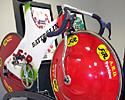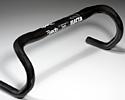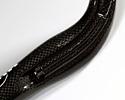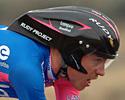
Recently on Cyclingnews.com |
Tech News – March 24, 2006Edited by John Stevenson Got tech? Send press releases, news, and tech questions to the Cyclingnews tech desk. 2007 XTR: the inside lineNew shifters, improved brake levers, carbon/titanium rings and, yes, lots of options in new MTB groupBy James Huang Try as Shimano might to keep the lid on details of the upcoming 2007 XTR group, there's only so much pressure that can build up before the top starts to blow. The new group will bear the M970 designation, signifying a total overhaul, and reliable industry sources have confirmed that Shimano has pulled out the stops for the new kit which promises to contain some very interesting new features. We don't have any pictures yet, but these tidbits of information should sufficiently whet your appetite. ShiftersThis is perhaps the most exciting part of the new kit. Although Shimano will continue to offer Dual Control gear changing, the company has clearly devoted a lot of resources toward developing a new trigger shifter in response to widespread demand (and the somewhat lukewarm response to Dual Control). Shimano has already released photos of the 'Dual Release' badging on the new XT shifters, but details as to its meaning were a bit on the fuzzy side. As some had speculated, the new release trigger will, indeed, be able to shift two gears in one pull for the first time in Shimano's trigger shifter history. However, Dual Release also signifies that the release trigger can be actuated by either pulling it back in traditional fashion or pushing it forward. Two gears can be shifted when moving the trigger in either direction, meaning that you will be able to quickly shift up to four gears in one combined movement. Since Shimano will offer both low-normal (Rapid Rise) and traditional rear derailleurs new XTR group, this means that riders will easily be able to shift multiple gears in either direction, regardless of which rear derailleur configuration they choose. Speaking of multiple gears, the new XTR group will almost certainly still use a nine-speed rear cassette, contrary to rampant speculation that Shimano was going to introduce the MTB market to ten-speed. Shimano apparently hasn't given up on the 14spd rear cassette idea that it patented a few years ago, but it is reportedly trying to push a new 140mm rear hub spacing standard on the industry first (hate to say it, but this is largely a good idea, in my opinion). The new triggers will also feature enhanced adjustability with a new low-profile clamp that is designed to sit either inboard or outboard of the brake lever depending on rider preferences. BrakesIf you can mount the triggers either side of the brake lever, that means there will be separate brake levers, right? Well spotted. Singlespeeders now have yet another reason to throw down another beer as Shimano has finally developed a separate XTR-level hydraulic brake lever. Our sources have informed us that the new lever is intentionally slim and low-profile for a clean overall look. Improvements in the lever internals may also provide improved performance as well. Reports suggest that Shimano has done away with the unnecessarily complex 90 degree banjo style of attaching the hydraulic line to the lever. This not only cleans things from an aesthetic perspective, but it also makes for a more direct path for the hydraulic fluid which is said to dramatically improve brake feel. The fluid reservoir for the new lever may also be integrated into the perch, although that detail could not be confirmed. The new hydraulic disc caliper appears to have received relatively minimal changes as the later versions of the XTR calipers were already quite good to begin with. Our sources suggest that Shimano may have slightly increased the fluid capacity of the caliper, though, to better combat brake fade due to overheating. Shimano will also continue to offer both six-bolt and Centerlock disc rotors for XTR, fulfilling the promises of "lots of options" for the new kit. CranksShimano will continue with its very well-received Hollowtech II outboard bearing bottom bracket system but is apparently feeling a bit deficient in the carbon department according to our sources. The crankarms themselves will still be hollow-forged aluminum (a material Shimano continues to argue is the best for the job), but Shimano has clearly heeded the cries of current XTR users that the existing middle ring displays somewhat poor durability. The new middle ring will be a carbon and titanium component similar to those made by smaller firms such as CarbonTi. The teeth themselves will be made of titanium for durability, but they will be attached to a carbon fiber main body for reduced weight (and points for coolness, no doubt). It still remains to be seen how Shimano will incorporate their signature complex arrangement of ramps, pins, and gates into this hybrid construction, but there's little doubt that it will be there in order to maintain's Shimano reputation as having the best shifting chainrings in the industry. PedalsFor the first time in the group's history, Shimano will offer an XTR-labeled clipless pedal (which will also bear the XTR-specific PD-M970 part number). The new pedal is said to offer an enlarged pedal platform for better support and stability as well as improved power transfer. There's no word yet on whether or not the new pedal will require a new cleat, but it would come as no surprise considering that Shimano is generally happy to abandon standards in pursuit of improved performance and the SPD cleat has remained virtually unchanged since its introduction. In fact, a new cleat would not only be somewhat expected, but may even be warranted if it can truly offer improved performance over the existing SH51 version. Shimano is clearly hoping that the new M970 XTR group will make at least a big an impact as M950 did back in the mid-90s. Whether or not they will admit it, Shimano is clearly feeling the competitive pressure from "the other big S" over in Chicago and is doggedly determined to claw their way back into the undisputed Number One position. Whatever the outcome, let's hear three cheers for healthy competition, eh? It's a good time to be a mountain biker.
Deda Electafies handlebarComponent maker Deda Elementi has announced a new carbon fiber road bike handlebar, the Electa. Weighing in at a claimed 207g, the new bar has an extra-wide 31.8mm section so that aero bars can be easily mounted next to the stem clamp, ergonomic top section, and larger cross-sections in the curves for increased rigidity. Campagnolo users will also like the double cable channels that provide a tidy place for both gear and brake cables. The Electa is available in 24cm, 44cm and 46cm widths, measured edge-to-edge. More info: www.dedaelementi.com
Rudy project pins tail on helmet
Last year the question was "Where are all the UCI-approved aero helmets?" This year, it seems we can't move for them, and here's an imminent new entry into the arena from Rudy Project. Better known for its eyewear, Rudy also has a helmet line, and is supplying Damiano Cunego and Lampre-Fondital with lids this year. The helmet Cunego's wearing here is a carbon fiber version of Rudy Project's Syton time trial helmet but as well as a change of materials from the Syton Supercomp model, the composite incarnation sports a much longer 'tail' that extends all the way to the rider's back. This should improve airflow off the helmet, improving times against the clock. At the moment the new lid is at the stage of being a handmade development sample and Rudy Project isn't saying much about details such as construction techniques, except to drop hints that something very clever is going on.
Rotor rings claim first road winThe elliptical chainring renaissance continued in Portugal a couple of weeks ago when Sergio Ribero of Team Barbot-Halicon scored the first professional road race win by a rider using Rotor's elliptical Q-rings. Ribero took first place in stage 1's uphill sprint finish, and followed it up three days later with second in stage 4 to finish second overall in the four-day race. Developed as a lighter and less expensive alternative to Rotor's cam-action crank, Q-rings are claimed to help reduce the effects of the 'dead spot' in a rider's pedal stroke by effectively reducing the size of the chainring at that moment. This lowers the gear the rider is pushing and speeds the foot through the point at which little or no force can be applied to the pedal. More info: www.rotorbike.com |

|
Blast from the past in Italia Bici
 The
latest special promotional feature in our Italia Bici series takes a look
at perhaps one of the most unusual bikes ever built. It was the mid-eighties
and after Francesco Moser's demolition of the Hour Record on a bike with
disc wheels it seemed like we were about to enter a whole new era in bike
design. In just a few years we'd be hanging aerodynamic carbon monocoque
bikes in the garage next to our flying cars.
The
latest special promotional feature in our Italia Bici series takes a look
at perhaps one of the most unusual bikes ever built. It was the mid-eighties
and after Francesco Moser's demolition of the Hour Record on a bike with
disc wheels it seemed like we were about to enter a whole new era in bike
design. In just a few years we'd be hanging aerodynamic carbon monocoque
bikes in the garage next to our flying cars.
Into this new world, Italian bike maker Battaglin rolled out a radical time trial bike for the prologue of the 1985 Giro d'Italia. Not only did it have an aerodynamic, monocoque frame, but its super-wide, bulbous front wheel acted as a fairing to shield the rider's feet from the wind. That rider was Roberto Visintini and he'd been going three seconds per kilometre faster in training on the new bike. Giovanni Battaglin tells the tale of what happened next.
Other features in our Italia Bici section take you behind the scenes at a fizik promotional shoot with Damiano Cunego; look at the development of Selle Italia seats; examine the history of De Rosa; go inside clothing maker De Marchi; give you the inside gen on Fulcrum's new wheels and get to the bottom of shorts comfort with lining maker Cytech. Italia Bici starts here.




